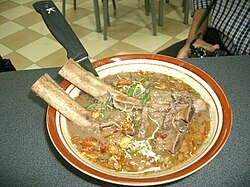 Konro soup | |
| Course | main course |
|---|---|
| Place of origin | Indonesia [1] |
| Region or state | Makassar, South Sulawesi |
| Serving temperature | hot |
| Main ingredients | Beef ribs, coriander, pangium edule |
| Variations | Grilled konro |
Konro is an Indonesian rib soup originating with the Makassarese people [1] of South Sulawesi. Usually this soup was made with ribs, such as spareribs [1] [2] or beef as main ingredient. The soup is brown-black in color and eaten either with burasa or ketupat cut into bite-size pieces or rice. The spicy and strong-tasting soup is made from a mixture of rich spices, which includes coriander, keluwak ( Pangium edule ); a fruit that gives it its blackish color, also small amount of nutmeg, turmeric, galangal, cinnamon, tamarind, lemongrass, clove, and salam (Indonesian bayleaf). [3]
